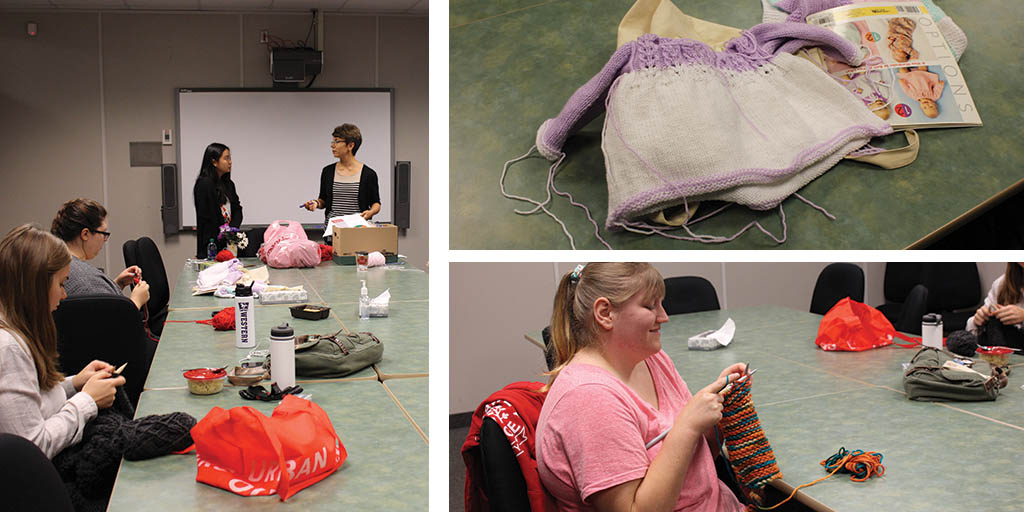Fanshawe strides to de-stigmatize mental health disorders
 CREDIT: JESSICA THOMPSON
CREDIT: JESSICA THOMPSONThe Passport to Wellness program, going into its second year at Fanshawe, is just one of the ways the college is trying to combat mental health disorders.
Over the past few years, Fanshawe has made large strides to help put the stigma of mental health to rest and help educate and raise awareness amongst faculty and students alike.
For faculty, this included providing a mental health first aid course where individuals learn how to identify mental health struggles amongst people around them and how to take strides in order to help anyone struggling.
“It was definitively beneficial because in my position I work around a lot of students and [being with the Fanshawe Student Union (FSU)], we are there for the students and it made sense to be able to relate with them and empathize what’s going on with [them],” said Darby Mousseau, creative director with the FSU, who took the course over the summer.
Mousseau said the course was beneficial because it’s important to recognize certain behaviours and be able to understand why it’s happening and how to properly address it. If you understand it properly you are able to point the individual in the right direction to get help.
According to Shelley Sinclair, the accessibility counsellor and co-ordinator of accessibility services at Fanshawe, as well as one of the trainers of the mental health first aid course, the course follows a similar guide to physical first aid training.
First, the course provides an overview of mental health, what it is, what the stats are and what the impacts are. Then, according to Sinclair, the course goes on to explore the stigma surrounding improper language and then explores other common disorders such as depression and anxiety.
Currently, according to the Mental Health Commission of Canada, the two aforementioned disorders are the most common mental health issues in Canada.
According to the same source, one in three people will have a mental health problem in the course of their lifetime. And this stat is from actual reported accounts of mental disorders, but frequently mental health problems go undiagnosed due to the stigma surrounding them. Therefore, Sinclair believes the number to be one in one.
“Everyone at some point in their life is going to experience a mental health problem.”
This course, however, is available to help those struggling and maybe even help prevent others from ever suffering.
“The goal of the mental health training is to preserve life, to prevent worsening of a condition, to promote health and to provide optimism and hope.”
As for students, Fanshawe provides Passport to Wellness programs, which are courses that students can drop into. The programs may include information on anxiety, stress management, anger management, etc.
The next Passport to Wellness will take place Oct. 12 in F2010 and will be a Knitwell Circle for students and staff.
According to Fanshawe’s website, the knitting circle promotes relaxation, stress relief, creativity and community. Materials will be provided for those wanting to work on community knitting projects, such as the Red Scarf Project.
Another important area where the stigma commonly arises from is in the language we use everyday.
“We all know language is very powerful [and] we all know mental health conditions are an invisible disability, it’s not something you can see, so historically there has been a lot of stigma around mental health disorders,” said Sinclair. “One way we can work on improving our understanding of mental health struggles is the language we apply to that.”
Examples of this, according to Sinclair, are to put the person first when referring to a disorder.
For example, replacing, “She is so bipolar” with, “The person with bipolar”. Another example is to remove hurtful words out of your vocabulary such as “crazy” or “retard”.
Sinclair also wanted to stress how we are now leaning away from using the term mental illness and instead using mental disorder or mental health problems.
The mental health first aid course was developed out of the Mental Health Commission of Canada several years ago as a result of recognizing that mental health is misunderstood and under-recognized.
And according to Sinclair, Fanshawe has adopted this outlook.
“Fanshawe adopted the Mental Health Commission of Canada’s method to increase our overall commitment to mental wellness to insure that we are supporting a healthy environment for students and for staff.”














